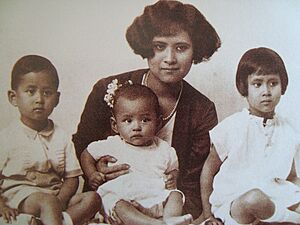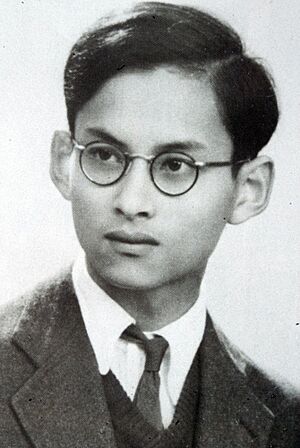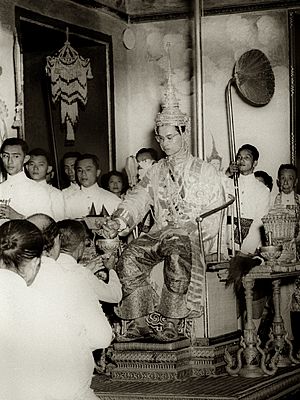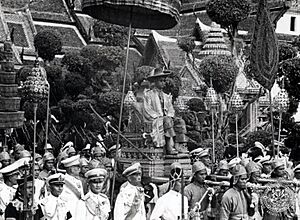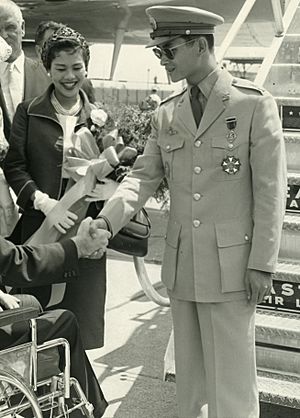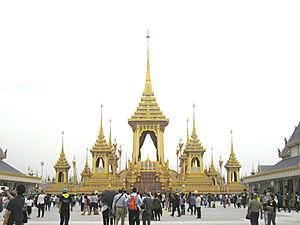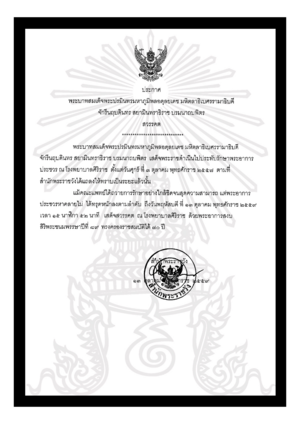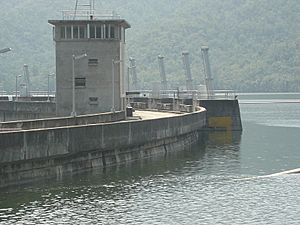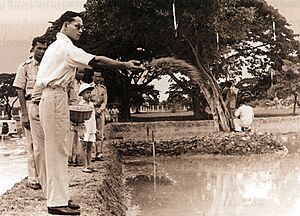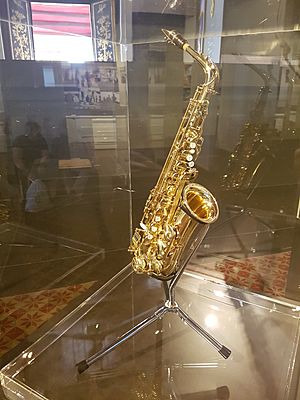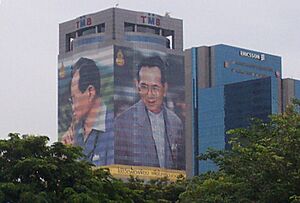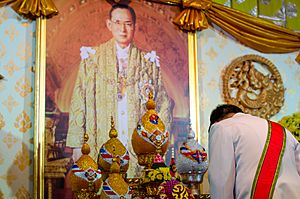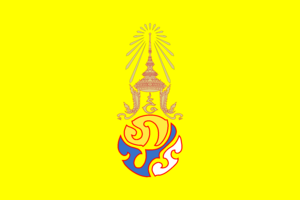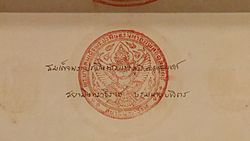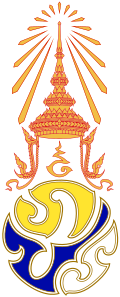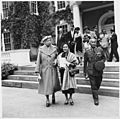Bhumibol Adulyadej facts for kids
Quick facts for kids Bhumibol Adulyadejภูมิพลอดุลยเดช |
|||||||||||||
|---|---|---|---|---|---|---|---|---|---|---|---|---|---|
| King Rama IX | |||||||||||||
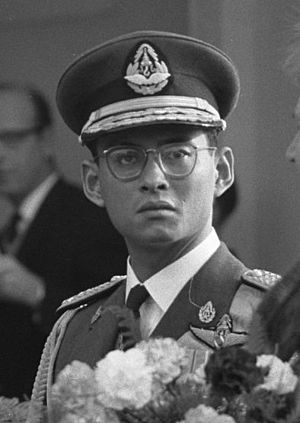
Bhumibol in 1960
|
|||||||||||||
| King of Thailand | |||||||||||||
| Reign | 9 June 1946 – 13 October 2016 | ||||||||||||
| Coronation | 5 May 1950 | ||||||||||||
| Predecessor | Ananda Mahidol (Rama VIII) | ||||||||||||
| Successor | Maha Vajiralongkorn (Rama X) | ||||||||||||
|
See list
|
|||||||||||||
| Born | Prince Bhumibol Adulyadej 5 December 1927 Mount Auburn Hospital, Cambridge, Massachusetts, US |
||||||||||||
| Died | 13 October 2016 (aged 88) Siriraj Hospital, Bangkok, Thailand |
||||||||||||
| Burial | 30 October 2017 Wat Bowonniwet Vihara, Wat Ratchabophit, Phra Nakhon, Bangkok (interment of ashes) |
||||||||||||
| Spouse | |||||||||||||
| Issue |
|
||||||||||||
|
|||||||||||||
| House | Mahidol | ||||||||||||
| Dynasty | Chakri | ||||||||||||
| Father | Mahidol Adulyadej, Prince of Songkla | ||||||||||||
| Mother | Sangwan Talapat | ||||||||||||
| Religion | Theravada | ||||||||||||
| Signature | |||||||||||||
| Military career | |||||||||||||
| Allegiance | Thailand | ||||||||||||
| Service/ |
Royal Thai Armed Forces | ||||||||||||
| Years of service | 1946–2016 | ||||||||||||
| Rank | Field marshal Admiral of the fleet Marshal of the Royal Thai Air Force |
||||||||||||
| Commands held | Royal Thai Armed Forces | ||||||||||||
Bhumibol Adulyadej (Thai: ภูมิพลอดุลยเดช; RTGS: Phumiphon Adunyadet; pronounced [pʰūː.mí.pʰōn ʔā.dūn.jā.dèːt]; (Sanskrit: bhūmi·bala atulya·teja - "might of the land, unparalleled brilliance"); 5 December 1927 – 13 October 2016), also known as King Bhumibol the Great, was the ninth king of Thailand. He was part of the Chakri dynasty and was known as Rama IX.
King Bhumibol reigned for 70 years and 126 days, from 9 June 1946 until his death in 2016. This made him one of the longest-reigning monarchs in history. During his time as king, many different prime ministers served the country.
He was highly respected by the people of Thailand. He passed away on 13 October 2016, at Siriraj Hospital in Bangkok. His son, Maha Vajiralongkorn, became the next King.
Contents
- Early Life of King Bhumibol
- Becoming King and His Marriage
- Coronation and Royal Titles
- King Bhumibol's Role in Thai Politics
- King Bhumibol's Health
- Death of King Bhumibol
- Royal Powers and Influence
- Royal Projects and Development
- 60th Anniversary Celebrations
- Private Life and Hobbies
- Royal Wealth
- Biographies
- Succession to the Throne
- King Bhumibol's Name
- Titles and Honours
- Issue
- Works by King Bhumibol
- Images for kids
- See also
Early Life of King Bhumibol
Bhumibol Adulyadej was born in Cambridge, Massachusetts, United States, on 5 December 1927. He was the youngest son of Prince Mahidol Adulyadej and his wife, Mom Sangwan (who later became Princess Srinagarindra). His father was studying at Harvard University at the time. This is why Bhumibol was the only Thai king born in the US. He had an older sister, Princess Galyani Vadhana, and an older brother, Prince Ananda Mahidol.
In 1928, Bhumibol came to Thailand. His father passed away in 1929 when Bhumibol was very young. He went to school briefly in Bangkok. In 1933, his mother moved the family to Switzerland, where he continued his education. In 1934, he received his first camera, which started his lifelong love for photography.
When his uncle, King Prajadhipok, stepped down from the throne in 1935, Bhumibol's nine-year-old brother, Ananda Mahidol, became King Rama VIII. However, the family stayed in Switzerland. They only returned to Thailand for a short time in 1938. In 1942, Bhumibol became interested in jazz music and started playing the saxophone. He loved music throughout his life. He studied sciences at the University of Lausanne before returning to Thailand after World War II ended in 1945.
Becoming King and His Marriage
Bhumibol became king after his brother, King Ananda Mahidol, passed away on 9 June 1946. The exact reasons for his brother's death are not fully clear.
After becoming king, Bhumibol went back to Switzerland to finish his studies. Even though he liked science, he decided to study law and political science instead. This was to help him prepare for his duties as king. His uncle, Prince Rangsit Prayurasakdi, was appointed to rule in his place for a while.
While studying in Switzerland, Bhumibol often visited Paris. There, he met Mom Rajawongse Sirikit Kitiyakara. She was the daughter of the Thai ambassador to France and a cousin of Bhumibol. She was 15 years old and was learning to play the piano.
In October 1948, Bhumibol was in a car accident near Lausanne. He hurt his back and lost sight in his right eye. While he was in the hospital, Sirikit visited him often. His mother asked Sirikit to continue her studies nearby so they could get to know each other better. They became engaged in July 1949 and married on 28 April 1950, just one week before his coronation.
King Bhumibol and Queen Sirikit had four children:
- Princess Ubolratana Rajakanya, born in 1951.
- King Maha Vajiralongkorn (Rama X), born in 1952.
- Princess Maha Chakri Sirindhorn, born in 1955.
- Princess Chulabhorn Walailak, born in 1957.
Coronation and Royal Titles
After a special ceremony for his brother, Bhumibol was crowned King of Thailand on 5 May 1950. The ceremony took place at the Grand Palace in Bangkok. This was the first coronation for a Thai king under a system where the king shares power with a government (a constitutional monarchy). During the ceremony, he promised to "reign with righteousness for the benefit and happiness of the Siamese people."
On Coronation Day in 1950, Bhumibol's wife, Sirikit, became Queen. Thailand celebrates 5 May as Coronation Day, which is a public holiday. On 9 June 2006, King Bhumibol celebrated 60 years as king, becoming the longest-reigning monarch in Thai history.
The King and Queen spent their honeymoon in Hua Hin before returning to Switzerland for the King to finish his studies. They came back to Thailand permanently in 1951.
It is a tradition for Buddhist men to become a monk for a short time when an older relative passes away. Following the death of his grandmother, Queen Savang Vadhana, Bhumibol became a monk for 15 days in 1956. During this time, Queen Sirikit was appointed to act as regent, meaning she managed the affairs of state in his place.
In English, King Bhumibol was sometimes called King Rama IX. But in Thailand, people often called him Nai Luang or Phra Chao Yu Hua, which means "the King" or "Lord Upon our Heads." He was also called Chao Chiwit, meaning "Lord of Life."
King Bhumibol's Role in Thai Politics
King Bhumibol played an important role in Thailand's political life. He was seen as a unifying figure for the country.
Early Years and Military Governments
In the early years of his reign, during the time of military governments, King Bhumibol's role was mostly ceremonial. However, he became more involved over time.
In 1957, a military leader named General Sarit Thanarat took power. King Bhumibol advised the previous leader to step down to avoid conflict. Under General Sarit, the monarchy became more visible and important. King Bhumibol started attending many public events, visiting different parts of the country, and supporting development projects. He also visited the United States and many countries in Europe in 1960.
Old royal ceremonies were brought back, and King Bhumibol's birthday (5 December) was made a national holiday. This showed the growing importance of the monarchy in public life.
Intervention in Times of Crisis
King Bhumibol often acted as a mediator during times of political trouble. In 1973, there were large student protests against the military government. King Bhumibol asked the military leaders to resign, and they left Thailand. This helped calm the situation.
Later, in 1976, there was more unrest, especially at Thammasat University. The King invited the former military leader, General Thanom, back to Thailand, which caused more protests. When violence broke out, the King supported a new military government that took over to restore order.
In 1992, Thailand faced another big political crisis. There were large protests and clashes between the military and protesters. People were worried about a civil war. King Bhumibol stepped in directly. He called the military leader, General Suchinda Kraprayoon, and the protest leader, Major General Chamlong Srimuang, to a televised meeting. He urged them to find a peaceful solution. Seeing both leaders kneeling before the King made a strong impact on the country. Soon after, the military leader resigned, and Thailand moved towards a civilian government. This was one of the few times King Bhumibol publicly intervened in a political conflict.
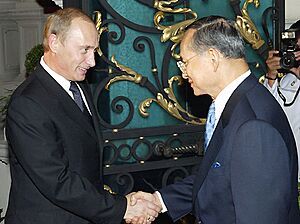
Later Political Events
In 2006, Thailand faced another political crisis. There were disagreements about elections. King Bhumibol made a speech saying that asking for a king-appointed prime minister was "undemocratic." He also called for fair elections. Later that year, the military took control of the government in a peaceful way. The military leaders said they were loyal to the King.
In 2014, after another period of political unrest, the military again took control. King Bhumibol formally appointed the military leader, General Prayut Chan-o-cha, to run the country. This royal approval helped legitimize the change in government.
King Bhumibol's Health
King Bhumibol experienced various health issues in his later years. He was hospitalized several times for different conditions. He was treated for back problems, a blood shortage to his brain, and lung inflammation. He also had kidney problems and received dialysis.
In his final days, he was placed on a ventilator. Many people gathered outside Siriraj Hospital to offer their prayers and support for the King.
Death of King Bhumibol
King Bhumibol Adulyadej passed away at Siriraj Hospital in Bangkok on 13 October 2016, at the age of 88. The next day, his body was moved in a procession to the Grand Palace for traditional ceremonies. Thousands of people lined the streets to show their love and respect. His son, Crown Prince Maha Vajiralongkorn, led the bathing ritual.
A special royal cremation ceremony took place over five days in October 2017. The actual cremation happened on 26 October 2017. Afterward, his ashes were placed in the Grand Palace and at two royal temples. The official mourning period ended on 30 October 2017. His son, King Vajiralongkorn, was crowned in May 2019.
Royal Powers and Influence
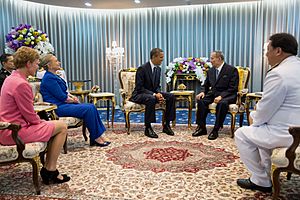
King Bhumibol held significant power, partly because of his great popularity. His powers were outlined in the Thai constitution, but they were sometimes interpreted in different ways. For example, he had the power to pardon criminals. All laws and royal commands related to state affairs needed to be signed by a minister, unless the constitution said otherwise.
He rarely vetoed laws passed by Parliament. In 1976, he refused to sign a law about elections, and Parliament did not try to pass it again. In 1954, he vetoed a land reform law twice before signing it.
King Bhumibol's influence was also seen through a "network monarchy," which included trusted advisors like Privy Council President Prem Tinsulanonda. This network worked behind the scenes to help guide political events. His popularity was so immense that people would respond to his requests for calm during protests.
Royal Projects and Development
King Bhumibol was deeply involved in many projects to help improve the lives of people in Thailand. These projects focused on social and economic development.
In the early years of his reign, he used his own money to make films and run a radio station from his palace. Later, with government support, he started many projects in rural areas. These projects were often promoted by the government and shown on state television.
During the 1980s, the government provided more financial and human resources to support royal projects. Many of these involved large irrigation systems to help farmers in rural areas.
In more recent times, King Bhumibol established the Chaipattana Foundation. This foundation promoted his "sufficiency economy" theory. This idea encouraged people to live in a way that is self-reliant and balanced, rather than focusing only on exports. After the 2006 military takeover, this "sufficiency economy" became an official goal in the constitution, and royal projects received more government funding.
Examples of Royal Projects
- Artificial Rainmaking: He developed the "sandwich" and "supersandwich" methods for making artificial rain to help with droughts.
- Sufficiency Economy Theory: This idea promotes living a balanced life, being self-sufficient, and using resources wisely.
- New Theory of Agriculture: A system for managing land and water for small-scale farmers.
- Rice Production: He worked on increasing rice production and improving different types of rice. For this, he received the first Borlaug Medallion in 2007.
- Vetiver Grass: He promoted using Vetiver Grass to improve soil and prevent erosion.
- Water Management: Projects like "Kaem Ling" (monkey cheeks) for water storage and "Fai Maeo" (cat weirs) for small dams helped manage water.
- Dams and Bridges: He supported the construction of important infrastructure like the Khun Dan Prakanchon Dam and the Rama VIII Bridge.
- Royal Medical Team: His personal doctors would offer medical care to local residents during his visits to villages.
In honor of his work in soil science, the United Nations celebrates the King's birthday, 5 December, as World Soil Day.
60th Anniversary Celebrations
The 60th anniversary of King Bhumibol's reign, also called the Diamond Jubilee, was celebrated in June 2006. Many events took place, including a royal barge procession on the Chao Phraya River, fireworks, art shows, and concerts. About 25,000 prisoners were also pardoned.
On 26 May 2006, United Nations Secretary-General Kofi Annan gave King Bhumibol the first Human Development Lifetime Achievement Award. On 9 June, the King and Queen appeared on a balcony at the Ananta Samakhom Throne Hall before hundreds of thousands of people. Royal visitors from 26 other countries attended the celebrations.
Private Life and Hobbies
| Monarchs of the Chakri dynasty |
|
|---|---|
| Phra Buddha Yodfa Chulaloke (Rama I) |
|
| Phra Buddha Loetla Nabhalai (Rama II) |
|
| Nangklao (Rama III) |
|
| Mongkut (Rama IV) |
|
| Chulalongkorn (Rama V) |
|
| Vajiravudh (Rama VI) |
|
| Prajadhipok (Rama VII) |
|
| Ananda Mahidol (Rama VIII) |
|
| Bhumibol Adulyadej (Rama IX) |
|
| Vajiralongkorn (Rama X) |
|
King Bhumibol was a very talented person with many hobbies. He was a painter, musician, photographer, author, and translator. He wrote books like Phra Mahachanok, based on a Buddhist story, and The Story of Thong Daeng, about his dog.
Music
King Bhumibol was an excellent jazz saxophone player and composer. He also played the clarinet, trumpet, guitar, and piano. He started composing his own music at 18, with his first piece being Candlelight Blues. He wrote 49 compositions in total, including jazz, marches, and patriotic Thai songs. He performed with famous jazz musicians like Benny Goodman.
He formed a jazz band called Lay Kram, which later became the Au Sau Wan Suk Band. He would perform with them live on Friday evenings and sometimes took song requests over the phone. He also played with his band at Thai universities and composed anthems for them.
In 1964, he received an honorary membership from Vienna's University of Music and Performing Arts. In 2000, he was given the Sanford Medal for his contributions to music from Yale School of Music. He was the first Asian to receive both these honors. In 2003, the University of North Texas College of Music also gave him an honorary doctorate in music. His love for jazz helped make Thailand a strong center for jazz music in Asia.
Sailing
King Bhumibol was also a skilled sailor and designed his own sailboats. He won a gold medal for sailing in the 1967 Southeast Asian Peninsular (SEAP) Games with his daughter, Princess Ubol Ratana. He even sailed 60 nautical miles across the Gulf of Thailand in a boat he built himself.
Radio Amateur
He was also a radio amateur with the call sign HS1A. He supported the Radio Amateur Society of Thailand (RAST).
Patents
King Bhumibol was the only Thai king to hold a patent. He received one in 1993 for a wastewater aerator called "Chai Pattana." He also had several patents for his rainmaking techniques, developed after 1955.
Royal Wealth
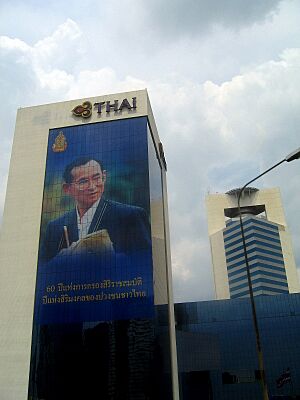
The wealth of the royal household and the Crown Property Bureau (CPB) was estimated to be very large. The CPB manages the assets of the Crown as an institution. It is set up by law and reports only to the King, not the government. The CPB owns parts of many companies and a lot of land, especially in central Bangkok. It also leases out many properties. The income from the CPB is not taxed.
King Bhumibol also owned the Golden Jubilee Diamond, which is the largest cut diamond in the world.
Biographies
There are several books written about King Bhumibol's life. One book, The Revolutionary King (2001) by William Stevenson, was written with some access to the royal family. Another book, The King Never Smiles (2006) by Paul M. Handley, was banned in Thailand because authorities said it could affect national security.
Succession to the Throne
Before 1972, there was talk that King Bhumibol might consider his eldest child, Princess Ubol Ratana, as his successor. However, she married someone who was not royal, and her royal title was removed. After this, his only son, Prince Vajiralongkorn, was given the title of Crown Prince of Siam on 28 December 1972, making him the official heir to the throne.
On 5 December 1977, Princess Sirindhorn was given the title "Siam Boromrajakumari" (Princess Royal of Siam). While the constitution was later changed to allow a princess to become queen if there was no male heir, this did not change Prince Vajiralongkorn's position as the main heir.
King Bhumibol's Name
King Bhumibol's US birth certificate simply said "Baby Songkla." His uncle, King Prajadhipok, chose his name, which comes from Sanskrit. Bhumibol Adulyadej means "Strength of the Land, Incomparable Power."
Titles and Honours
| Styles of King Bhumibol Adulyadej Rama IX of Thailand |
|
|---|---|
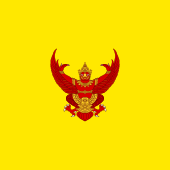 |
|
| Reference style | His Majesty |
| Spoken style | Your Majesty |
Titles and Styles
- 5 December 1927 – 9 July 1935: His Highness Prince Bhumibol Aduldej
- 9 July 1935 – 9 June 1946: His Royal Highness Prince Bhumibol Adulyadej of Siam
- 9 June 1946 – 13 October 2016: His Majesty The King of Thailand
Military Rank
His highest military rank was Field Marshal. He also held ranks such as Admiral of the Fleet and Marshal of the Royal Thai Air Force.
Issue
| Name | Birth | Marriage | Children | Grandchildren | |
|---|---|---|---|---|---|
| Date | Spouse | ||||
| Princess Ubolratana Rajakanya | 5 April 1951 | 29 July 1981 Divorced 1998 |
Peter Ladd Jensen | Ploypailin Jensen | Maximus Wheeler Leonardo Wheeler Airy Wheeler |
| Poom Jensen | None | ||||
| Sirikitiya Jensen | None | ||||
| King Maha Vajiralongkorn | 28 July 1952 | 3 January 1977 Divorced 12 August 1991 |
Soamsawali Kitiyakara | Princess Bajrakitiyabha | None |
| February 1994 Divorced 1996 |
Yuvadhida Polpraserth | Juthavachara Vivacharawongse | None | ||
| Vacharaesorn Vivacharawongse | None | ||||
| Chakriwat Vivacharawongse | None | ||||
| Vatchrawee Vivacharawongse | None | ||||
| Princess Sirivannavari Nariratana | None | ||||
| 10 February 2001 Divorced 11 December 2014 |
Srirasmi Suwadee | Prince Dipangkorn Rasmijoti | None | ||
| 1 May 2019 | Suthida | None | |||
| Princess Maha Chakri Sirindhorn | 2 April 1955 | None | |||
| Princess Chulabhorn Walailak | 4 July 1957 | 1982 Divorced 1996 |
Virayudh Tishyasarin | Princess Siribha Chudabhorn | None |
| Princess Aditiyadorn Kitikhun | None | ||||
Works by King Bhumibol
- King Bhumibol Adulyadej of Thailand. The Story of Tongdaeng. Amarin Book, Bangkok. 2004. ISBN: 974-272-917-4
- King Bhumibol Adulyadej of Thailand. The Story of Mahajanaka: Cartoon Edition. Amarin Book, Bangkok. 1999. ISBN: 974-272-074-6
- King Bhumibol Adulyadej of Thailand. The Story of Mahajanaka. Amarin Book, Bangkok. 1997. ISBN: 974-8364-71-2
- King Bhumibol Adulyadej of Thailand, Chaturong Pramkaew (Ed.). My Country Thailand...land of Everlasting Smile. Amarin Book, Bangkok. 1995. ISBN: 974-8363-53-8
- King Bhumibol Adulyadej of Thailand. His Majesty the King's Photographs in the Development of the Country. Photographic Society of Thailand & Thai E, Bangkok. 1992. ISBN: 974-88805-0-8
- King Bhumibol Adulyadej of Thailand. Paintings by his Majesty the King: Special exhibition for the Rattanakosin Bicentennial Celebration at the National Gallery, Chao Fa Road, Bangkok, 1 April – 30 June 1982. National Gallery, Bangkok. 1982. ASIN B0007CCDMO
Images for kids
-
Marshal and Mrs. Phibunsongkhram with Eleanor Roosevelt
-
Royal intervention on the night of 20 May. Chamlong Srimuang (left) and Suchinda Kraprayoon (middle) submit to the King (seated).
See also
 In Spanish: Bhumibol Adulyadej para niños
In Spanish: Bhumibol Adulyadej para niños
- History of Thailand (1932–1973)
- History of Thailand (1973–2001)
- Public holidays in Thailand
- List of covers of Time magazine (1960s)
Namesakes
- Bhumibol Adulyadej Hospital
- Kanchanaphisek Bridge
- Rama IX Bridge


